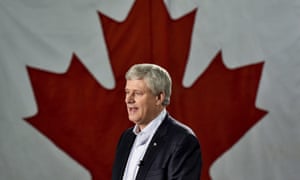Casting The Die
"Canadians will make a critical decision about the direction of our country, a decision with real consequences, a decision about who has the proven experience today to keep our economy strong and our country safe."
Prime Minister Stephen Harper
 |
| Stephen Harper on the federal election campaign trail in Saskatoon, Saskatchewan. Photograph: Nathan Denette/AP |
"Canada named world's most well-respected country" -- so concludes a study by an international research organization which had polled 48,000 people on a range of indices which included technology, social and economic policies and international perception, to give Canada first place, the fourth time in a period of five years of such evaluations.
A second report was issued this week by the banking group Credit Suisse which indicated that Canada "has a disproportionate number of millionaires", a state of economic well-being that included Canada's vast middle class, so well done by that that segment of the population qualifies among the world's wealthiest ten percent.
This is how Canada, on its record of performance in all relevant areas among the world's most advanced, democratic and free societies is seen outside the country. Within, there's another story being told, and it is being told primarily by the opposition political parties, all of whom decry the poor performance of the Conservative-led government that has ensured stability in the country even while its G7 counterparts have been challenged in ways Canada has not been.
The global financial meltdown that spelled difficulties and harried concern for most European countries and the United States, barely registered in Canada from 2008 forward, when the country's banking system was being cited for its excellent financial management. The Conservative-led government deftly brought the country out of its far shallower share of the global financial crisis.
And has since then brought huge benefits to Canada's future financial stability with the signing of a number of international free trade agreements, a high priority for this government. Canada is a country indisputably among the world's most prosperous and peaceful. The emphasis on Alberta oilsands development and distribution resulted in employment both locally and further afield in other provinces.
The current Prime Minister made conciliatory advances toward First Nations, addressing past wrongs by previous governments in other centuries. He apologized for the discrimination suffered by specific immigrant groups by a then-racist Canada based on European connections and immigration, spurning the emigration aspirations of people from Asia, Africa and Nazi-occupied Europe, consigning Jews who could not escape the death chambers to annihilation.
Although conservative in ideology and action, Prime Minister Harper demonstrated the statesmanship of accommodation to the broad Canadian public's values in matters such as women's and gay rights. There were initiatives like removing the monopoly of the wheat board, and putting an end to the gun registry as a result of commonsense realization that those who use such weapons illegally obtain them illegally. This government reduced the burden of taxes significantly for taxpayers, while maintaining health-care funding, balancing the budget in the process.
It is true that in a number of instances, this government and the Prime Minister in particular has taken an approach that does not find favour with most Canadians, from stilling the voices of the government science community, to cutting back on science funding projects, but by and large this three-term government has done its job and done it outstandingly. Yet Canadians have conceived an irrational hatred for Stephen Harper, because largely, it is the popular thing to do.
Some demographics detest the man because he is perceived to be 'unfriendly' and stiff, others because his moral compass leads him to position Canada with the State of Israel, against the impossible odds it faces in the Middle East harmful to its existence. Yet this unfriendly and stiff man who does show his very comfortable human side from time to time, appears incapable of influencing the public to view him objectively beyond their visceral dislike for a capital-C conservative.
His skills transcend governance and economics, sliding into a love of the country's first-place sport and his ability to translate that love into a well-received published history of hockey which he wrote himself, a tribute to his literary skills. His musical skills and his love and enjoyment of music and his ability as a musician have been demonstrated and admired by some, largely ignored by those who are determined to let nothing get in the way of their rage against him.
The Canadian public will have the opportunity to cast their final judgement on his ten-year record of governance as Prime Minister of Canada. The anyone-but-Harper campaign has its myriad supporters and late polls suggest that the Liberal Party of Canada under an adolescent-reprise of former Prime Minister Pierre Trudeau may stage a come-back, and should that occur, it would represent a blow for the continuance of good government in the country.
| Conservative Leader Stephen Harper at a campaign stop on Oct. 18, 2015 |
Labels: Canada, Democracy, Economy, Human Relations, Political Realities, Social Welfare
0 Comments:
Post a Comment
<< Home